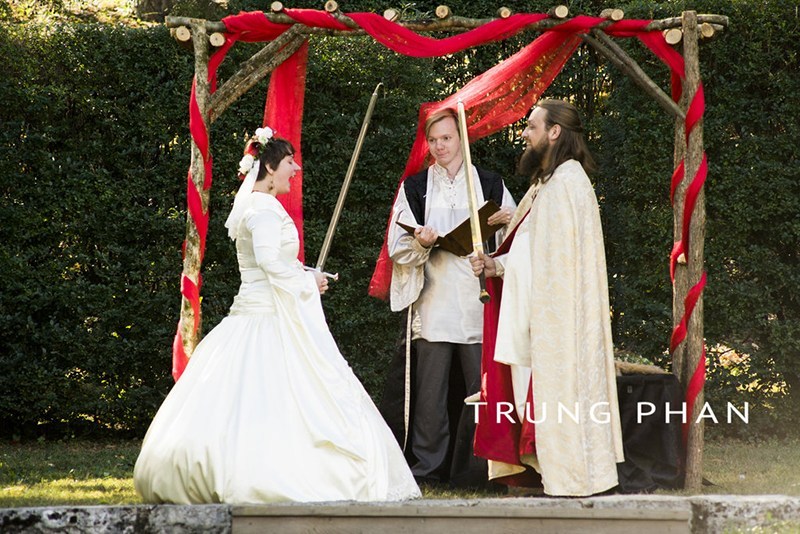
The traditional vows to love, honor and cherish so long as you both shall live go back to the Renaissance, when they were written in the Book of Common Prayer, and they were well known in the oral tradition by then, so it's fair to call them medieval.
The current custom of writing your own vows pretty much guarantees that your vows will be new and modern… But what if you want something both traditional and fresh? Look to wedding vows from ancient faiths.
Viking vows
The bride and groom pictured at the top of this post went with Viking inspiration for their gorgeous red and black wedding, right down to the dragon cake and the archery.
A classic work of Viking literature includes this swoonworthy vow:
There shall be one end for us both; one bond after our vows; nor shall our first love aimlessly perish. Happy am I to have won the joy of such a consort; I shall not go down basely in loneliness to the gods of Tartarus. So let the encircling bonds grip my throat in the midst; the final anguish shall bring with it pleasure only, since the certain hope remains of renewed love, and death shall prove to have its own delights. Each world holds joy, and in the twin regions shall the repose of our united souls win fame, our equal faithfulness in love.
Another Viking couple chose a bilingual Icelandic and English ceremony with a final vow spoken together.
We do now proclaim ourselves one in flesh and in spririt, and pledge that from this time on, we will take the responsibilties and exercise the privileges of an independant household in the community of humankind.
Ancient Greek vows

This stunning couple took on the roles of Hades and Persephone in their Ancient Greek underworld-inspired wedding.
Modern Greek Orthodox weddings don't include vows, but Ancient Greek weddings included words and actions that sounds a lot like vows. The bride's father would shake the groom's hand, saying, “I give her to you.” The bride's mother would lift the wedding torch. The bride's veil was lifted and the bride and groom gazed into one another's eyes.
Wedding vows from ancient faiths don't have to be taken too literally. Ancient Greek brides and grooms might have been satisfied with gazing into each other's eyes, but modern offbeat brides may want a vow. “I have fled the bad, I have found the better,” was chanted during Ancient Greek wedding processions, and it could make a charming vow spoken in unison by the bride and groom together.
Celtic wedding vows

There are several well-known Celtic wedding vows. This one may be particularly suited to feminist weddings:
Ye are Blood of my Blood, and Bone of my Bone.
I give ye my Body, that we Two might be One.
I give ye my Spirit, `til our Life shall be Done.
You cannot possess me for I belong to myself
But while we both wish it, I give you that which is mine to give
You cannot command me, for I am a free person
But I shall serve you in those ways you require
and the honeycomb will taste sweeter coming from my hand.
Ancient traditions can feel new again, and still have the mystery and beauty of the traditional.









